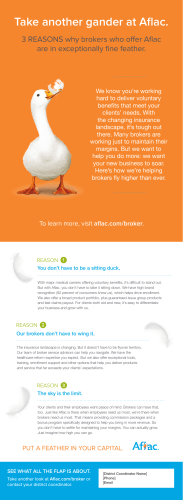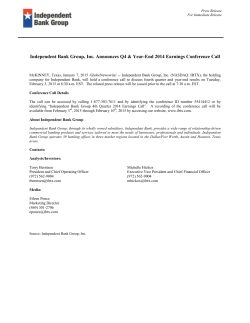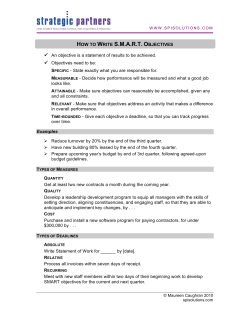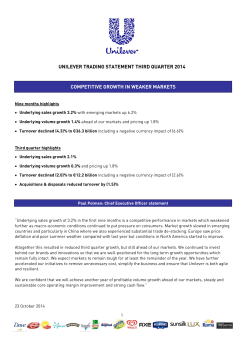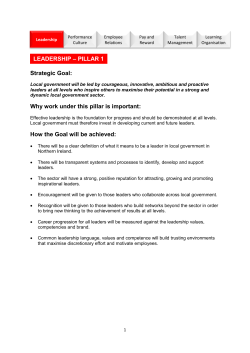
View News Release - Aflac Investor Information | Aflac
News Release FOR IMMEDIATE RELEASE Aflac Incorporated Announces First Quarter Results, Declares Second Quarter Cash Dividend, Affirms 2015 Operating EPS Target COLUMBUS, Georgia – April 28, 2015 – Aflac Incorporated today reported its first quarter results. Reflecting the weaker yen/dollar exchange rate, total revenues fell 7.3% to $5.2 billion during the first quarter of 2015, compared with $5.6 billion in the first quarter of 2014. Net earnings were $663 million, or $1.51 per diluted share, compared with $732 million, or $1.60 per share, a year ago. Net earnings in the first quarter of 2015 included after-tax net realized investment losses of $3 million, or nil per diluted share, compared with net after-tax losses of $36 million, or $.08 per diluted share, a year ago. After-tax realized investment gains net of losses from securities transactions in the quarter were $40 million, or $.10 per diluted share. Hedging costs related to certain dollar investments of Aflac Japan on an after-tax basis, were $9 million in the quarter, or $.02 per diluted share. Realized after-tax net investment losses from other derivative and hedging activities in the quarter were $34 million, or $.08 per diluted share. In addition, net earnings included a loss of $12 million, or $.03 per diluted share, from other and nonrecurring items. Aflac believes that an analysis of operating earnings, a non-GAAP financial measure, is vitally important to an understanding of the company’s underlying profitability drivers. Aflac defines operating earnings as the profits derived from operations, inclusive of interest cash flows associated with notes payable, but before realized investment gains and losses from securities transactions, impairments, and derivative and hedging activities, as well as other and nonrecurring items. Aflac's derivative activities are primarily used to hedge foreign exchange and interest rate risk in the company’s investment portfolio as well as manage foreign exchange risk in certain notes payable and forecasted cash flows denominated in yen. Management uses operating earnings to evaluate the financial performance of Aflac’s insurance operations because realized gains and losses from securities transactions, impairments, and derivative and hedging activities, as well as other and nonrecurring items, tend to be driven by general economic conditions and events or related to infrequent activities not directly associated with the company’s insurance operations, and therefore may obscure the underlying fundamentals and trends in Aflac’s insurance operations. Furthermore, because a significant portion of Aflac's business is in Japan, where the functional currency is the yen, the company believes it is equally important to understand the impact on operating earnings from translating yen into dollars. Aflac Japan’s yen-denominated income statement is translated from yen into dollars using an average exchange rate for the reporting period, and the balance sheet is translated using the exchange rate at the end of the period. However, except for certain transactions such as profit repatriation and the Aflac Japan dollar investment program, the company does not actually convert yen into dollars. As a result, Aflac views foreign currency translation as a financial reporting issue rather than an economic event for the company or its shareholders. Because changes in exchange rates distort the growth rates of operations, readers of Aflac's financial statements are also encouraged to evaluate financial performance excluding the impact of foreign currency translation. The chart toward the end of this release presents a comparison of selected income statement items with and without foreign currency changes to illustrate the effect of currency. The average yen/dollar exchange rate in the first quarter of 2015 was 119.16, or 13.8% weaker than the average rate of 102.70 in the first quarter of 2014. Operating earnings in the first quarter were $678 million, compared with $774 million in the first quarter of 2014. Operating earnings per diluted share in the quarter decreased by 8.9% from a year ago to $1.54. The weaker yen/dollar exchange rate decreased operating earnings per diluted share by $.13 for the first quarter. Excluding the impact from the weaker yen, operating earnings per diluted share decreased 1.2%. Total investments and cash at the end of March 2015 were $108.7 billion, compared with $107.3 billion at December 31, 2014. In the first quarter, Aflac repurchased $600 million, or 9.8 million shares, of its common stock. At the end of March, the company had 19.7 million shares available for purchase under its share repurchase authorizations. Shareholders’ equity was $18.6 billion, or $42.97 per share, at March 31, 2015, compared with $18.3 billion, or $41.47 per share, at December 31, 2014. Shareholders’ equity at the end of the first quarter included a net unrealized gain on investment securities and derivatives of $5.0 billion, compared with a net unrealized gain of $4.7 billion at the end of December 2014. The annualized return on average shareholders’ equity in the first quarter was 14.3%. On an operating basis (excluding total net realized investment gains/losses in net earnings, unrealized investment gains/losses, and derivative gains/losses in shareholders’ equity), the annualized return on average shareholders’ equity was 19.8% for the first quarter of 2015, or 21.5%, excluding the impact of the yen. AFLAC JAPAN In yen terms, Aflac Japan’s premium income rose .2% in the first quarter. Net investment income increased 7.2%. Investment income growth was magnified by the weaker yen/dollar exchange rate because approximately 48% of Aflac Japan’s first quarter investment income was dollar-denominated, compared with 45% a year ago. Total revenues were up 1.3% in the first quarter. The pretax operating profit margin increased in the first quarter to 22.1% from 22.0% in the prior year. Pretax operating earnings in yen increased 1.8% on a reported basis and decreased 2.9% on a currency-neutral basis. Aflac Japan’s growth rates in dollar terms for the first quarter were suppressed as a result of the significantly weaker yen/dollar exchange rate. Premium income decreased 13.5% to $3.1 billion in the first quarter. Net investment income was down 7.5% to $613 million. Total revenues decreased 12.6% to $3.7 billion. Pretax operating earnings declined 12.2% to $819 million. In the first quarter, total new annualized premium sales fell 2.2% to ¥27.0 billion, or $226 million. Third sector sales, which include cancer and medical products, increased 21.3% in the quarter. As expected, first sector sales, which include WAYS and child endowment, declined 29.8% in the quarter primarily reflecting the continued focus on the sale of third sector products. AFLAC U.S. Aflac U.S. premium income increased 3.5% to $1.3 billion in the first quarter. Net investment income was up 3.3% to $166 million. Total revenues increased 3.6% to $1.5 billion. The pretax operating profit margin was 18.9%, compared with 20.8% a year ago. Pretax operating earnings were $285 million, a decrease of 6.1% for the quarter. The decline largely reflects the expenses that were attributable to the changes made to our sales organization. Aflac U.S. total new annualized premium sales decreased .5% in the quarter to $316 million. Additionally, persistency in the quarter was 76.7%, compared with 76.3% a year ago. DIVIDEND The board of directors declared the second quarter cash dividend. The second quarter dividend of $.39 per share is payable on June 1, 2015, to shareholders of record at the close of business on May 20, 2015. OUTLOOK Commenting on the company’s first quarter results, Chairman and Chief Executive Officer Daniel P. Amos stated: “Aflac Japan, our largest earnings contributor, generated strong financial and sales results in yen terms for the quarter. Sales of Aflac Japan’s third sector products were up 21.3% in the quarter, which was a great start toward our expectation that third sector sales will average an increase of 15% for the first nine months of this year. While we still believe that the sales growth of third sector products will be down sharply in the fourth quarter relative to the prior year due to difficult comparisons, we will continue to look for ways to improve our fourth quarter results. “From a financial perspective, Aflac U.S. also performed well in the first quarter. As I mentioned during the fourth quarter conference call, we expected first quarter sales would be challenging. However, as we’ve discussed, we made significant changes to our distribution system in the U.S. market over the last several months, and we still believe these changes will have a beneficial impact on our organization. As such, we remain focused on increasing Aflac U.S. sales 3% to 7% for the year. As always, we will work toward expanding our distribution capabilities to access employers of all sizes by seeking opportunities to leverage our brand strength and attractive product portfolio in the evolving health care environment. “We remain committed to maintaining strong capital ratios on behalf of our policyholders. We improved our capital position for 2015 by entering into a new reinsurance agreement on March 31, 2015, which released approximately ¥130 billion of Aflac Japan’s regulatory reserves. Additionally, 90% of that transaction was retroceded to an Aflac Incorporated subsidiary effective April 1. As such, we expect our capital ratios will remain strong. We believe this capital strength puts us in an excellent position to repatriate about ¥200 billion to the United States for the calendar year 2015, which reinforces our plan to repurchase about $1.3 billion of our common stock in 2015. “I want to reiterate that our objective for 2015 is to increase operating earnings per diluted share 2% to 7% on a currency neutral basis. If the yen averages 120 to 125 to the dollar for the second quarter, we would expect earnings in the second quarter to be approximately $1.46 to $1.57 per diluted share. Using that same exchange rate assumption, we would expect full-year reported operating earnings to be about $5.74 to $6.15 per diluted share. In April, we executed a make-whole transaction to enhance our consolidated capital position. As a result of this transaction, we will incur a non-operating charge of approximately $.34 in the second quarter of 2015. However, operating earnings per diluted share for the remainder of 2015 will benefit by approximately $.07 due to a net reduction in interest expense. Challenging financial markets and significantly depressed interest rates make it difficult to invest cash flows at attractive yields. Therefore, we will remain very disciplined in selling first sector products in Japan, which will reduce investable cash flows. As always, we are working very hard to achieve our earnings-per-share objective while also delivering on our promise to policyholders.” ABOUT AFLAC When a policyholder gets sick or hurt, Aflac pays cash benefits fast. For nearly six decades, Aflac insurance policies have given policyholders the opportunity to focus on recovery, not financial stress. In the United States, Aflac is the leading provider of voluntary insurance at the work site. Through its trailblazing One Day PaySM initiative, Aflac U.S. can receive, process, approve and disburse payment for eligible claims in one business day. In Japan, Aflac is the leading provider of medical and cancer insurance and insures one in four households. Aflac individual and group insurance products help provide protection to more than 50 million people worldwide. For nine consecutive years, Aflac has been recognized by Ethisphere magazine as one of the World's Most Ethical Companies. In 2015, Fortune magazine recognized Aflac as one of the 100 Best Companies to Work For in America for the 17th consecutive year. Also, in 2015, Fortune magazine included Aflac on its list of Most Admired Companies for the 14th time, ranking the company No. 1 in innovation for the insurance, life and health category. Aflac Incorporated is a Fortune 500 company listed on the New York Stock Exchange under the symbol AFL. To find out more about Aflac and One Day Pay℠, visit aflac.com or espanol.aflac.com. A copy of Aflac’s Financial Analysts Briefing (FAB) supplement for the quarter can be found on the “Investors” page at aflac.com. Aflac Incorporated will webcast its quarterly conference call via the “Investors” page of aflac.com at 9:00 a.m. (EDT) on Wednesday, April 29, 2015. AFLAC INCORPORATED AND SUBSIDIARIES CONDENSED INCOME STATEMENT (UNAUDITED – IN MILLIONS, EXCEPT FOR SHARE AND PER-SHARE AMOUNTS) THREE MONTHS ENDED MARCH 31, 2015 2014 % Change $ 5,226 $ 5,640 (7.3)% Benefits and claims 2,952 3,220 (8.3) Total acquisition and operating expenses 1,261 1,316 (4.2) Earnings before income taxes 1,013 1,104 (8.3) 350 372 Total revenues Income taxes Net earnings $ 663 $ 732 (9.4)% Net earnings per share – basic $ 1.52 $ 1.61 (5.6)% 1.51 1.60 (5.6) Shares used to compute earnings per share (000): Basic Diluted 437,306 439,927 454,731 457,699 (3.8)% (3.9) Dividends paid per share $ $ 5.4 % Net earnings per share – diluted .39 .37 AFLAC INCORPORATED AND SUBSIDIARIES CONDENSED BALANCE SHEET (UNAUDITED – IN MILLIONS, EXCEPT FOR SHARE AMOUNTS) MARCH 31, 2015 2014 % Change $108,711 $ 110,493 (1.6)% Deferred policy acquisition costs 8,319 8,965 (7.2) Other assets 4,371 3,834 14.0 $121,401 $ 123,292 (1.5)% $ 85,564 $ (7.9)% Assets: Total investments and cash Total assets Liabilities and shareholders’ equity: Policy liabilities 92,890 Notes payable 6,282 4,913 27.9 Other liabilities 10,918 9,813 11.3 Shareholders’ equity 18,637 15,676 18.9 $121,401 $ 123,292 (1.5)% 433,771 454,028 (4.5)% Total liabilities and shareholders’ equity Shares outstanding at end of period (000) RECONCILIATION OF OPERATING EARNINGS TO NET EARNINGS (UNAUDITED – IN MILLIONS, EXCEPT FOR PER-SHARE AMOUNTS) THREE MONTHS ENDED MARCH 31, Operating earnings 2015 $ Reconciling items, net of tax: Realized investment gains (losses): Securities transactions and impairments Hedge costs related to foreign currency investments Impact of other derivative/hedging activities Other and non-recurring income (loss) Net earnings $ Operating earnings per diluted share Reconciling items, net of tax: Realized investment gains (losses): Securities transactions and impairments Hedge costs related to foreign currency investments Impact of other derivative/hedging activities Other and non-recurring income (loss) Net earnings per diluted share 678 2014 $ 774 40 25 (9) (34) (12) (6) (55) (6) 663 (12.5)% 732 (9.4)% $ 1.54 $ 1.69 (8.9)% .10 .05 (.02) (.08) (.03) (.01) (.12) (.01) $ 1.51 $ % Change $ 1.60 (5.6)% EFFECT OF FOREIGN CURRENCY ON OPERATING RESULTS1 (SELECTED PERCENTAGE CHANGES, UNAUDITED) THREE MONTHS ENDED MARCH 31, 2015 Including Currency Changes Excluding Currency Changes2 Premium income (8.7)% Net investment income (5.4) .8 Total benefits and expenses (7.1) 3.0 (12.5) (5.0) Operating earnings Operating earnings per diluted share 1 2 (8.9) 1.5% (1.2) The numbers in this table are presented on an operating basis, as previously described. Amounts excluding currency changes were determined using the same yen/dollar exchange rate for the current period as the comparable period in the prior year. 2015 OPERATING EARNINGS PER SHARE SCENARIOS Average Exchange Rate Annual Operating EPS % Growth Over 2014 Yen Impact $ .18 100 $ 6.47 - 6.77 5.0 - 9.9% 105.46* 6.29 - 6.59 2.1 - 7.0 – 115 6.01 - 6.31 (2.4) - 2.4 (.28) 125 5.77 - 6.07 (6.3) - (1.5) (.52) 135 5.56 - 5.86 (9.7) - (4.9) (.73) *Actual 2014 weighted-average exchange rate FORWARD-LOOKING INFORMATION The Private Securities Litigation Reform Act of 1995 provides a "safe harbor" to encourage companies to provide prospective information, so long as those informational statements are identified as forward-looking and are accompanied by meaningful cautionary statements identifying important factors that could cause actual results to differ materially from those included in the forward-looking statements. We desire to take advantage of these provisions. This document contains cautionary statements identifying important factors that could cause actual results to differ materially from those projected herein, and in any other statements made by company officials in communications with the financial community and contained in documents filed with the Securities and Exchange Commission (SEC). Forward-looking statements are not based on historical information and relate to future operations, strategies, financial results or other developments. Furthermore, forward-looking information is subject to numerous assumptions, risks and uncertainties. In particular, statements containing words such as "expect," "anticipate," "believe," "goal," "objective," "may," "should," "estimate," "intends," "projects," "will," "assumes," "potential," "target" or similar words as well as specific projections of future results, generally qualify as forward-looking. Aflac undertakes no obligation to update such forwardlooking statements. We caution readers that the following factors, in addition to other factors mentioned from time to time, could cause actual results to differ materially from those contemplated by the forward-looking statements: difficult conditions in global capital markets and the economy; governmental actions for the purpose of stabilizing the financial markets; defaults and credit downgrades of securities in our investment portfolio; exposure to significant financial and capital markets risk; fluctuations in foreign currency exchange rates; significant changes in investment yield rates; credit and other risks associated with Aflac's investment in perpetual securities; differing judgments applied to investment valuations; significant valuation judgments in determination of amount of impairments taken on our investments; limited availability of acceptable yen-denominated investments; concentration of our investments in any particular single-issuer or sector; concentration of business in Japan; decline in creditworthiness of other financial institutions; deviations in actual experience from pricing and reserving assumptions; subsidiaries' ability to pay dividends to Aflac Incorporated; ineffective risk management policies and procedures; changes in law or regulation by governmental authorities; ability to attract and retain qualified sales associates and employees; decreases in our financial strength or debt ratings; ability to continue to develop and implement improvements in information technology systems; interruption in telecommunication, information technology and other operational systems, or a failure to maintain the security, confidentiality or privacy of sensitive data residing on such systems; changes in U.S. and/or Japanese accounting standards; failure to comply with restrictions on patient privacy and information security; level and outcome of litigation; ability to effectively manage key executive succession; catastrophic events including, but not necessarily limited to, epidemics, pandemics, tornadoes, hurricanes, earthquakes, tsunamis, acts of terrorism and damage incidental to such events; ongoing changes in our industry; events that damage our reputation; increased expenses for pension and other postretirement plans; and failure of internal controls or corporate governance policies and procedures. Analyst and investor contact – Robin Y. Wilkey, 706.596.3264 or 800.235.2667; FAX: 706.324.6330 or rwilkey@aflac.com Media contact – Catherine Blades, 706.596.3014; FAX: 706.320.2288 or cblades@aflac.com ###
© Copyright 2025


